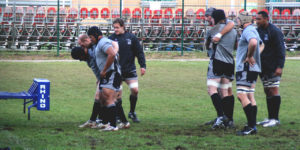Size matters in rugby. In many instances, the bigger player will often prevail. This means a lot of players obsess over their scale weight. In televised rugby games, player weight is an often-quoted statistic, and total pack weight is seen as a decisive factor in scrums.
It’s often said that it takes mass to move mass, and it’s undeniable that once a big player gets up to speed, it takes a lot more effort to stop them than a smaller, lighter player. It’s also harder to drive bigger players off the ball.
However, there is a tipping point where body mass becomes a drawback rather than a benefit. It doesn’t matter how big you are; if your bodyweight exceeds your ability to play the game to your best ability, you could soon find your ample buttocks warming the subs bench!
Of all the players on the pitch, props have the reputation for being the biggest and widest. That’s hardly surprising as mass plays an important part in scrummaging. But, once the scrum breaks up, the mass that made you an immovable object could effectively take you out of the game if you are unable to keep up with the next phase of play.
If you are a XXXL prop, you may find your game improves if you drop some excess fat and reduce your body-weight. That doesn’t mean you have to turn your keg power belly into a six-pack, but losing just 5-10% of your body-weight could have a big impact on your performance.
Lose fat, not muscle
Losing weight often leads to a drop off in strength and performance. For that reason, a lot of players are somewhat reticent to diet down to a lighter body-weight. However, it’s important to differentiate between functional mass and non-functional mass.
For all intents and purposes, fat is non-functional mass. Another way to look at it is as dead weight. Other than providing you with shape, padding and stored energy, fat is nothing more than extra weight you have to drag up and down the pitch.
Excess fat can slow you down, decrease acceleration, reduce your agility, and tire you out. Not convinced? Try wearing a weighted vest loaded with 5-10% of your body-weight for your next rugby practice. You’ll soon discover how extra weight negatively affects your performance.
Muscle, on the other hand, is the biological engine that powers your movements. It contributes to your weight but it’s functional mass. If you lose weight by losing muscle, it’s only natural to experience a decline in strength and performance. In contrast, if you lose fat weight, your muscles have less dead weight to carry, and that should lead to an increase in performance.
The take home point is that losing fat is more important than losing weight. For this reason, most rugby players should worry less about their weight and more about their body composition or body fat percentage.
To illustrate this, consider the following 200 lb. players. Despite all weighing the same, the leaner the player, the more muscle mass they have and that potentially means they will be the more capable player.
- 200 lb. at 15% body fat = 30 lb. of fat weight
- 200 lb. at 25% body fat = 50 lb. of fat weight
- 200 lb. at 35% body fat = 70 lb. of fat weight
So, how do you lose fat while keeping muscle and preserving strength and performance? Let’s discuss!
Train for strength
Your body is the master adapter. It adapts to the stresses and strains it is exposed to. If you lift heavy weights, your muscles will do their best to get stronger and bigger. This is the very essence of exercise specificity.
If you want to avoid losing strength and muscle while losing fat, it’s crucial that you train for strength. Use it or lose it, bro! This is not the time to switch to light weights and high reps; a strategy that all-but guarantees muscle loss.
Instead, make sure your gym workouts include heavy weight/low strength rep and moderate weight/moderate rep hypertrophy training. You might not gain strength and muscle mass while dropping fat, but you should be able to maintain most of what you’ve got.
Pump up the protein
Protein is an important nutrient for ruggers. It speeds up recovery and helps repair the damage caused by playing and training for rugby. Protein is also highly satiating and can boost your metabolism, leading to faster fat loss.
Make sure you consume at least one gram per pound of body-weight, or around two grams per kilo. Build every meal you eat around protein and snack on protein between meals too. A quality protein supplement will make consuming enough protein much easier.
Forget the faddy diets
As a rugger, you need plenty of energy to fuel your workouts and your rugby performance. Most mainstream fat loss diets are not suitable for ruggers as the don’t provide enough food to fuel an active lifestyle. Heck; most diets don’t provide enough food for a starving hamster!
Instead, ruggers should adopt a sensible dietary approach to fat loss that provides them with the energy and nutrients they need for training and playing.
Easy-to-implement fat loss strategies include:
- Replacing one meal a day with a high protein, low calorie, nutrient-dense smoothie
- Replacing some daily starchy carbs with non-starchy vegetables
- Eating a little less fat
- Cut down on sugar
- Cut down on alcohol
- Reducing the size of main meals by 15-25%
- Skipping breakfast
There is no need to follow the latest celebrity-endorsed starvation diet to lose fat. All you need to do is eat like a grown up, i.e. less junk and processed foods, and more natural foods.
Don’t overdo the cardio
Cardio burns calories and fat, but often to the detriment of muscle mass. Because of exercise specificity, if you do a lot of cardio, your body will look for ways to make your cardio workouts easier. One way it does this is by ridding itself of excess weight in the form of muscle mass.
Those big delts and biceps are nothing more than dead weight during a lot of cardio activities. That’s why long-distance runners have relatively little muscle mass even if they complement their running with strength training.
Cardio IS important for rugby, but unless you want to lose muscle mass, don’t overdo the long duration, high frequency cardio. Instead, use interval training and strength training circuits to improve your fitness while preserving that all-important muscle mass.
Lose fat slowly
Severe dietary and exercise inventions can lead to fast weight loss, but that weight is likely to be muscle as well as fat. Slow fat loss is much less likely to adversely affect your performance. This does mean you’ll have to exercise patience but, overall, you’ll get better results if you do.
How much weight you can safely lose per week depends in genetics, dietary compliance, and how much fat you have to lose in the first place, but 1-2 lb. or about ½-1 kg per week should be achievable, sustainable, and have minimal impact on your performance.
Test your performance
Losing fat, even when done slowly and properly, can still have an impact on your rugby performance. Make sure you monitor your performance so you can take steps to stabilize your weight if you notice any significant decline.
Test your current sprinting speed, cardiovascular endurance, and strength and retest periodically as your fat levels decrease.
Mass is important for successful rugby, but you can have too much of a good thing. If you feel like your weight is more of a hindrance than a help, maybe it’s time to shed some of that excess baggage. And the best time to do this? That’ll be the off-season.


